Content from the Brookings Institution India Center is now archived. After seven years of an impactful partnership, as of September 11, 2020, Brookings India is now the Centre for Social and Economic Progress, an independent public policy institution based in India.
Indian and Israeli relations are getting even friendlier: Indian Foreign Minister Sushma Swaraj visited Israel in January, and the trip is widely thought to precede higher level visits, including by Prime Minister Narendra Modi (he’d be the first Indian head of government to visit Israel). Israeli President Reuven Rivlin and Prime Minister Benjamin Netanyahu have both also indicated that they plan to travel to India “soon.”
The foreign minister’s visit was part of the ongoing Indian effort not just to broaden and deepen India’s relationship with Israel, but also to make it more public. But the trip—not just to Israel, but to what the Indian government now routinely calls the state of Palestine—also highlighted the Modi government’s attempt to de-hyphenate India’s relations with the Israelis and Palestinians.
What is the state of India’s relationship with Israel, the Modi government’s approach toward it, and this de-hyphenated approach?
A blossoming friendship
Since India normalized relations with Israel in 1992, the partnership has developed steadily. The countries have a close defense, homeland security, and intelligence relationship—one that the two governments do not talk much about publicly. Shared concerns about terrorism have proven to be a key driver; so have commercial interests (including Israel’s quest for additional markets and India’s desire to diversify its defense suppliers, get access to better technology, and co-develop and co-produce equipment). India has become Israeli defense companies’ largest customer. Israel, in turn, has shot up on India’s list of suppliers.
In the early 1990s, Israel—like the United States—did not really figure on India’s list of defense suppliers. However, between 2005 and 2014, it accounted for 7 percent (in dollar terms) of military equipment deliveries—the third highest after Russia and the United States. As Indian President Pranab Mukherjee recently noted, Israel has crucially come through for India at times “when India needed them the most” (i.e. during crises or when other sources have not been available, for example, due to sanctions). The president referred to the assistance given during the Kargil crisis in 1999 in particular, but there has also been less publicly-acknowledged help in the past, including during India’s 1965 and 1971 wars with Pakistan.
Beyond the defense and security relationship, cooperation in the agricultural sector—water management, research and development, sharing of best practices—might have the most on-the-ground impact, including in terms of building constituencies for Israel at the state level in India. Israeli ambassadors have indeed been nurturing this constituency and reaching out to the chief ministers of Indian states for a number of years. (Incidentally, India, for its part, has felt that the closer relationship with Israel has created a constituency for it in the United States.)
Economic ties have also grown: The two countries are negotiating a free trade agreement, and have been trying to encourage greater investments from the other. The success of Indian and Israeli information technology companies has particularly led to interest in collaboration in that sector.
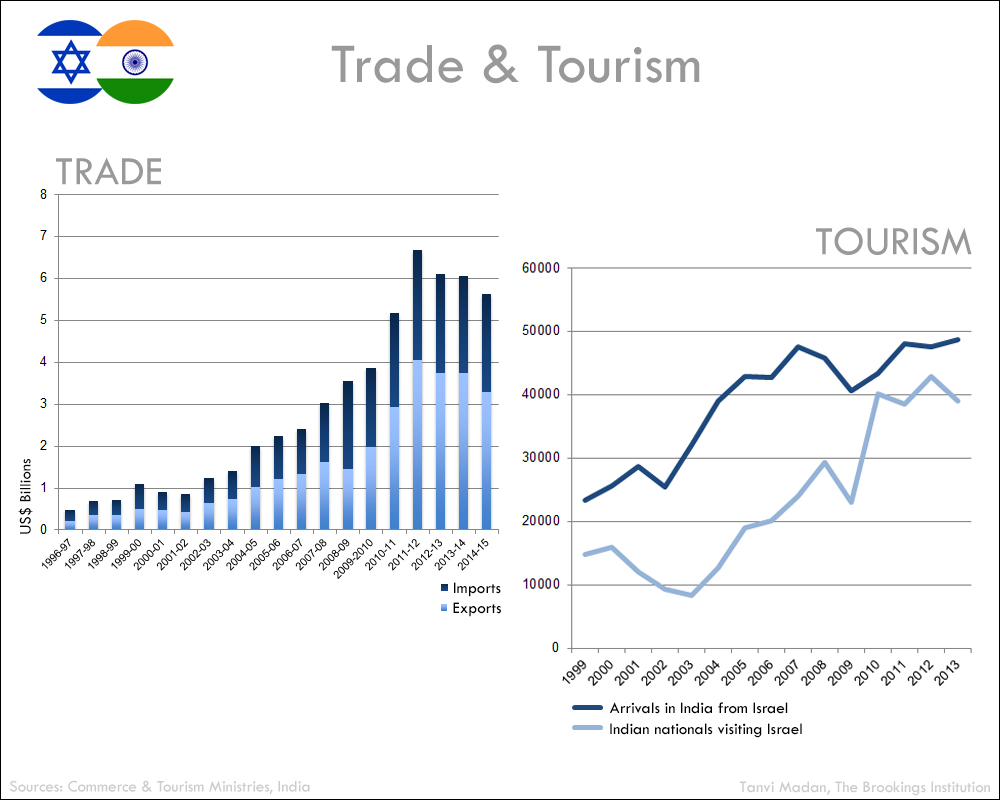
The governments have also been trying to increase people-to-people interaction through educational exchanges and tourism, with some success. Israeli tourism officials have highlighted the 13 percent increase in arrivals from India over the last year. And tourist arrivals to India from Israel have doubled over the last 15 years, including thousands of Israelis visiting after their compulsory military service.
Let’s go public
The India-Israel relationship has developed under Indian governments of different stripes. It was normalized by a Congress party-led government and progressed considerably during the United Progressive Alliance coalition government led by the party between 2004 and 2014. However, while some ministers and senior military officials exchanged visits during that decade, there were not that many high-visibility visits—especially from India to Israel, with the foreign minister only visiting once. A planned 2006 trip by then Defense Minister Mukherjee was reportedly cancelled because of Israeli military operations in Gaza and then the Lebanon war. The last Israeli prime minister to visit India was Ariel Sharon in 2003, and no defense minister had ever visited despite those ties.
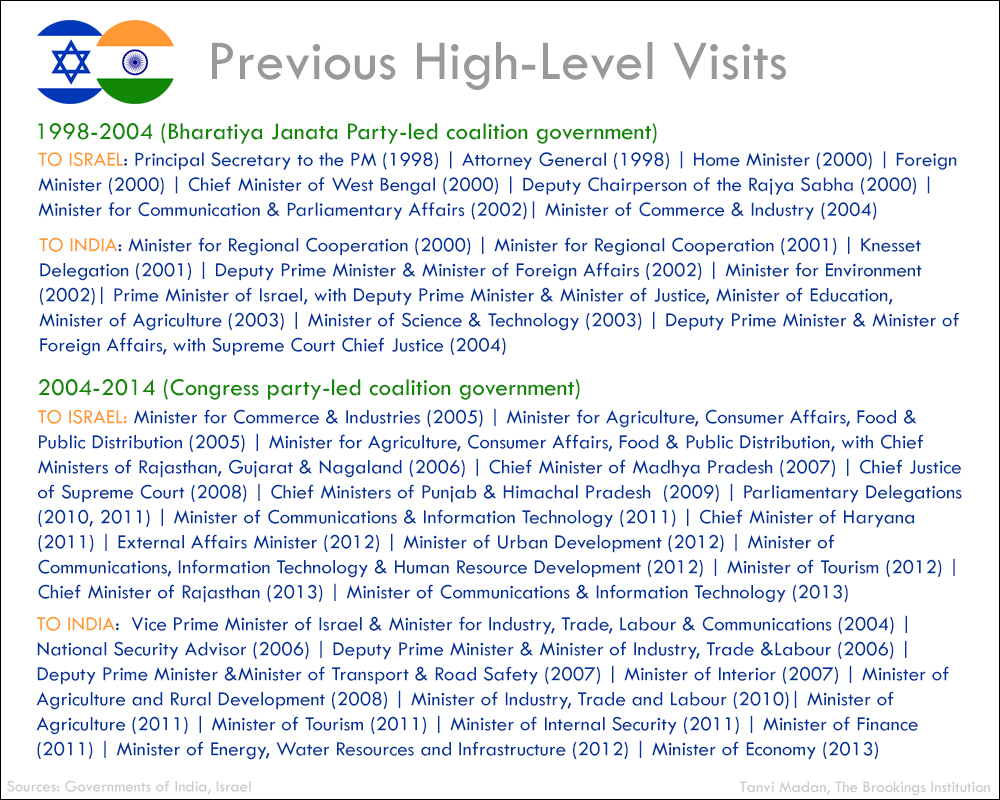
The Israeli ambassador has talked about the relationship being “held under the carpet.” More bluntly, in private, Israeli officials and commentators have said that India has treated Israel like a “mistress”—happy to engage intimately in private, but hesitant to acknowledge the relationship in public. The explanations for this have ranged from Indian domestic political sensitivities to its relations with the Arab countries.
[I]n private, Israeli officials and commentators have said that India has treated Israel like a “mistress”—happy to engage intimately in private, but hesitant to acknowledge the relationship in public.
When the Bharatiya Janata Party (BJP)-led government took office in May 2014 with Modi at its helm, there was a belief that the partnership with Israel would be a priority and more visible. Relations under the BJP-led coalition government between 1998 and 2004 had been more conspicuous. When in opposition, BJP leaders had visited Israel, and also been supportive of that country in election manifestos and speeches.
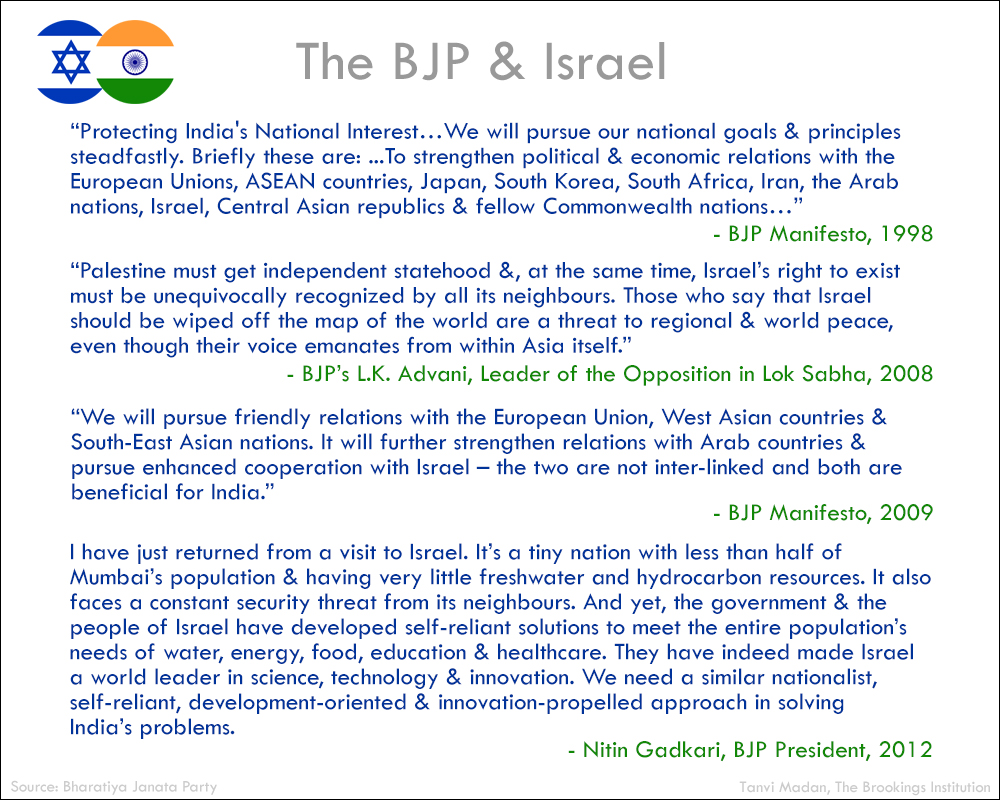
As chief minister of the state of Gujarat, Modi himself had expressed admiration for Israel’s achievements, including “how it has overcome various adversities to make the desert bloom.” Traveling there in 2006 with the central agricultural minister, he also helped facilitate trips for politicians, business leaders, and farmers from his state to Israel. His government welcomed Israeli investment and technological assistance in the agricultural, dairy, and irrigation sectors. And, at a time when Modi was not welcome in many Western capitals, Israelis reciprocated: Businesses and government engaged with him, with Israeli ambassadors and consul generals from Mumbai meeting with him long before European and American officials did so. Thus, Modi’s elevation to prime minister was welcomed in Israel, as was the appointment as foreign minister of Swaraj, a former head of the India-Israel Parliamentary Friendship Group.
However, the Modi government’s response to the Gaza crisis in summer 2014 left many perplexed and some of its supporters disappointed. The Indian government initially sought to avoid a debate on the crisis in the Indian parliament, on the grounds that it did not want “discourteous references” to a friend (Israel). After opposition complaints, there was a debate but the government nixed a resolution. In its official statements, the Modi government consistently expressed concern about the violence in general—and, in particular, both the loss of civilian life in Gaza and the provocations against Israel—and called for both sides to exercise restraint and deescalate. Yet, it then voted in support of the U.N. Human Rights Council (UNHRC) resolution that condemned Israel, a move that left observers—including many in the BJP base—wondering why the government didn’t instead abstain.
Since then, however, the Modi government has moved toward the expected approach. The first sign of this was Modi’s decision to meet with Netanyahu on the sidelines of the opening of the U.N. General Assembly in 2014—despite reported hesitation on the part of some in the foreign ministry. Since then, there have been a number of high-level visits and interactions (and Twitter exchanges), including a few “firsts.” This past October, Pranab Mukherjee, for example, became the first Indian president to travel to Israel, where he declared the state of the relationship to be “excellent.”
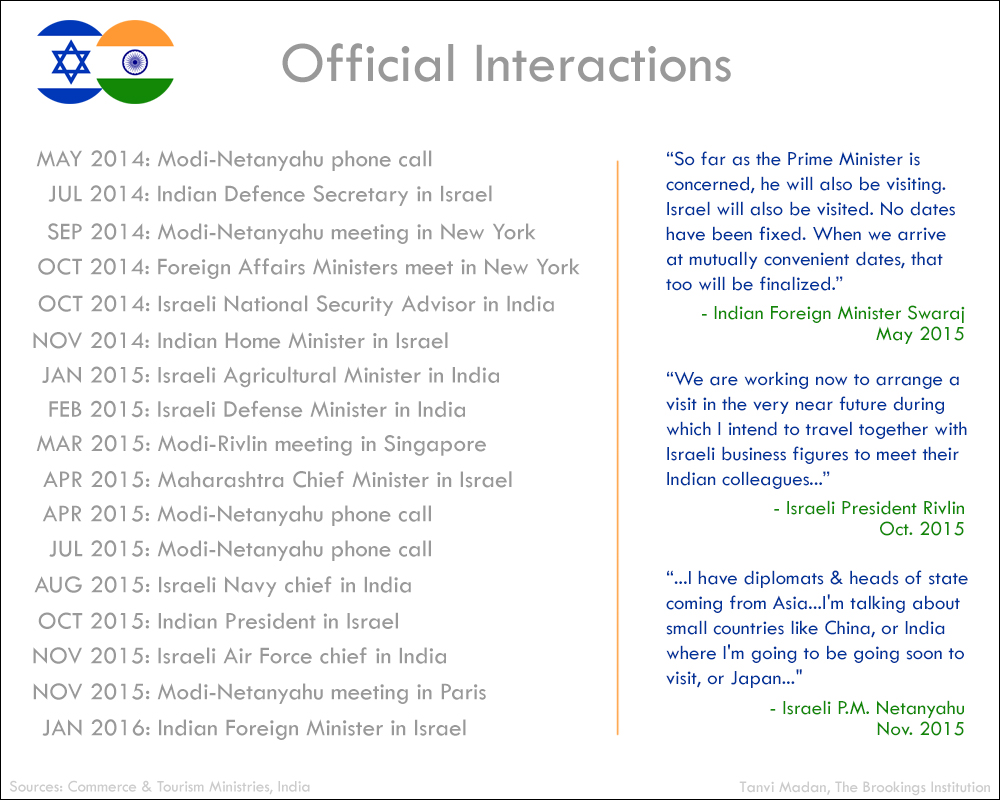
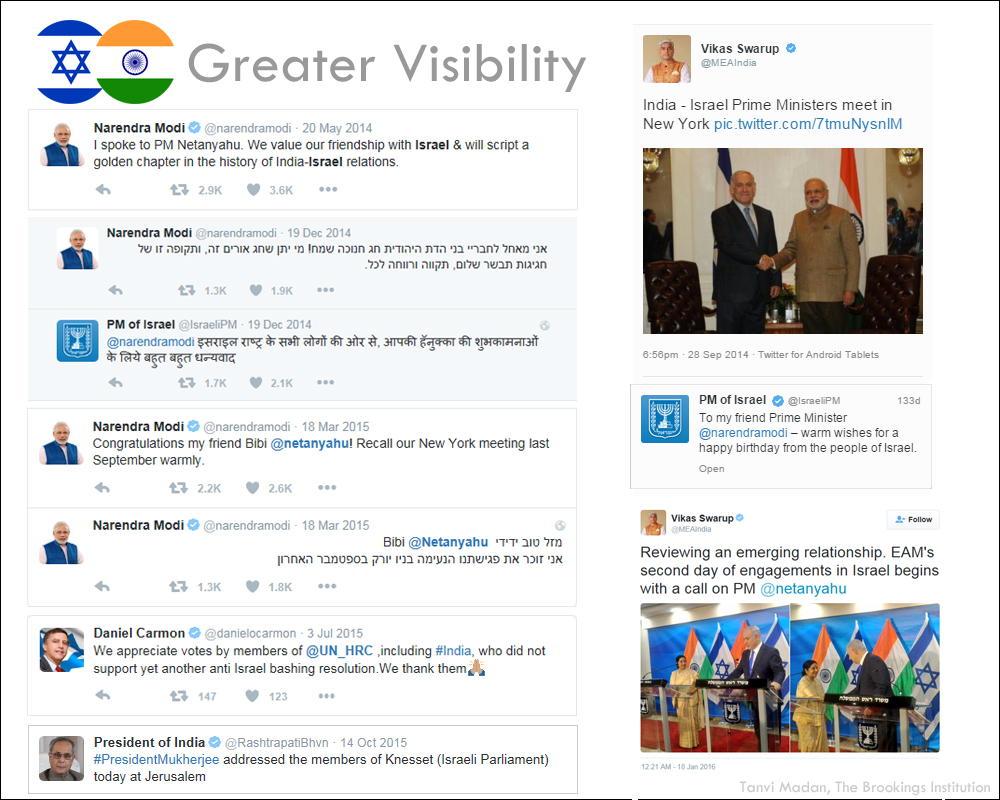
The Israeli ambassador to India has observed the “high visibility” the relationship now enjoys. Also noticed more widely was India abstaining in a July 2015 UNHRC vote on a report criticizing Israeli actions in the 2014 Gaza crisis. Indian diplomats explained the vote as due to the mention of the International Criminal Court (ICC) in the resolution, but observers pointed out that India has voted for other resolutions mentioning the ICC. Israeli commentators saw the abstention as “quite dramatic;” the Israeli ambassador expressed gratitude. Palestinian officials, on the other hand, expressed “shock” and criticized the vote as a “departure.”
In the defense space, cooperation is only growing: The Indian government moved forward on (delayed) deals to purchase Spike anti-tank missiles and Barak missiles for its navy; it recently tested the jointly-developed Barak 8 missile system, along with Israel Aerospace Industries; and an Indian private sector company has reportedly formed a joint venture with an Israeli company to produce small arms. Cooperation is also continuing in the agricultural sector, with 30 centers of excellence either established or planned across 10 Indian states. More broadly, the two governments are seeking to facilitate greater economic ties, as well as science and technology collaboration.
There have been questions about why Modi hasn’t visited Israel yet, despite the more visible bonhomie. But, in many ways, it made sense to have the Indian president take the first leadership-level visit during this government. Mukherjee’s position as head of state, as well as the fact that he was a life-long Congress party member and minister, helped convey to both Indian and Israeli audiences that this is not a one-party approach. This point was reinforced by the accompanying delegation of MPs representing different political parties and parts of the country. For similar reasons, it would not be surprising if there was a Rivlin visit to India before a Netanyahu one.
De-hyphenation?
The deepening—and more open—relationship with Israel, however, hasn’t been accompanied by a U-turn on the Indian government’s policy toward Palestine. What the Modi government seems to be doing is trying to de-hyphenate its ties with Israel and Palestine. Previous governments have also tried to keep the relationships on parallel tracks—but the current one has sought to make both relationships more direct and visible, less linked to the other, while also making it clear that neither will enjoy a veto on India’s relations with the other.
The deepening—and more open—relationship with Israel, however, hasn’t been accompanied by a U-turn on the Indian government’s policy toward Palestine.
The Modi government doesn’t demure from referring to the “state of Palestine” rather than “the Palestinian Authority.” It held the first-ever Foreign Office consultations with the Palestinians last spring, and the Indian foreign ministry made it a point to release separate press releases for the president’s and the foreign minister’s trips to Israel and Palestine. The Indian president became the first foreign head of state to stay overnight in Ramallah. Modi met with Mahmoud Abbas, whom the Indian government refers to as the “president of the state of Palestine, on the sidelines of both the U.N. General Assembly meeting in New York and the climate change summit in Paris in 2015. The Indian foreign minister met with Abbas in 2014 in New York, and again in Ramallah on her visit. During their trips, both she and the Indian president also went to the mausoleum of Yasser Arafat (who the BJP in the past called “the illustrious leader of the Palestinian people”).
The government has reiterated India’s traditional position on a two-state solution, indicating its belief in an independent Palestinian state with East Jerusalem as its capital. It voted in favor of the resolution on raising the Palestinian flag at the United Nations, and has continued to sign on to BRICS declarations “oppos[ing] the continuous Israeli settlement activities in the Occupied Territories.” In Ramallah, Sushma Swaraj emphasized that India’s support for Palestinians remained “undiluted.”
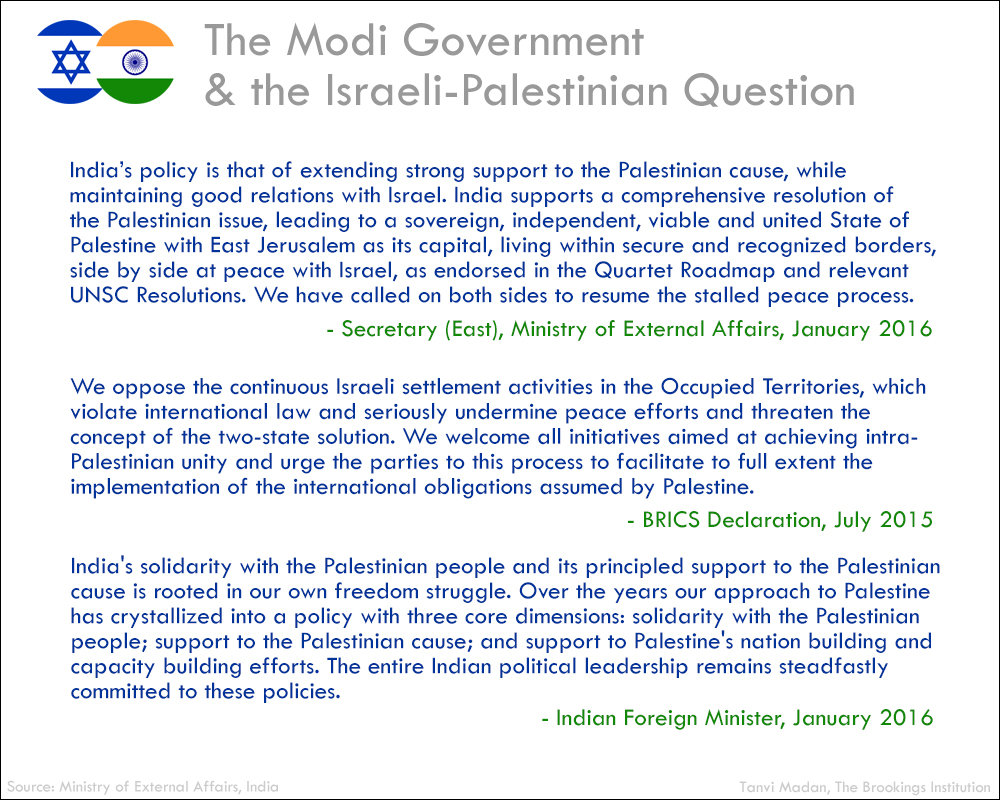
The continuity on this front is not just driven by historic and domestic political factors, but also by India’s broader balancing act in the region. Even as India’s relations with Israel have deepened, it has maintained—and even enhanced—its relations with Iran and the Gulf Cooperation Council (GCC) countries. Modi has welcomed the emir of Qatar, visited the UAE, and met with Iran’s Hassan Rouhani. The first-ever Arab-India Cooperation Forum ministerial meeting also took place in January. It would not be surprising if the Indian prime minister visited Saudi Arabia this year or there were high-level visits exchanged between Delhi and Tehran. The government has emphasized its “strategic intent and commitment to simultaneously enhance relations with the Arab world as well as Israel, without allowing it to become a zero sum game.” And, overall, the Israelis, Palestinians, and GCC countries have not pushed for Delhi to make a choice.
The de-hyphenated approach, in turn, potentially gives Indian policymakers more space to take India’s relationship with Israel further. But, as was evident during the Indian president’s visit to the region, it hasn’t been problem-free and it has not been feasible to keep the two relationships entirely insulated. An upsurge in violence reportedly caused Israel to nix a proposal for Mukherjee to visit the Al-Aqsa mosque in Jerusalem. There was also some heartburn about the Israeli delay in clearing 30 Indians’ computers destined for an India-Palestine Centre for Excellence in Information and Communication Technology at Al-Quds University in Ramallah, as well as its refusal to allow communications equipment to be transferred. In the Israeli press, there was criticism of the president’s lack of mention of Palestinian violence. The Indian president and the foreign ministry also found themselves having to explain the president’s remark in Israel that “religion cannot be the basis of a state.”
There have been other differences between India and Israel as well, notably on Iran (something officials have tended not to discuss publicly). There might be other difficulties in the future, stemming, for example, from: negative public and media reaction in India if there’s another Israel-Palestine crisis; the stalled free trade agreement negotiations; potential Israeli defense sales to China; renewed questions about defense acquisitions from Israel; or the behavior of Israeli tourists in India. But the relationship is likely to continue to move forward, and increase in visibility, including with visits by Rivlin, Netanyahu, and Modi—potentially before the 25th anniversary of the two countries establishing full diplomatic relations on January 29, 2017.
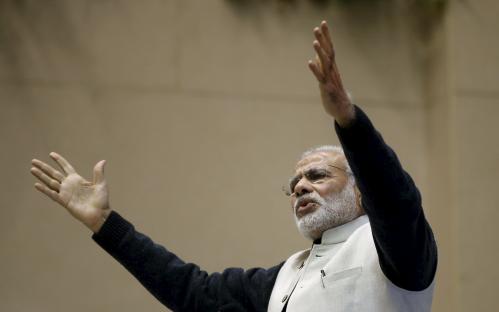
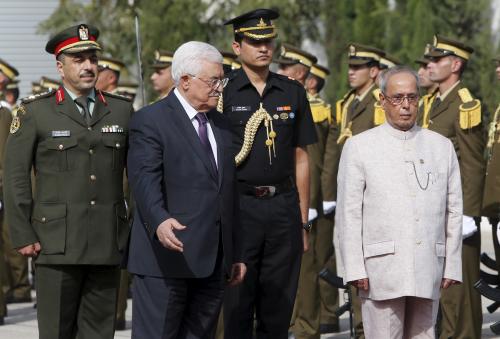
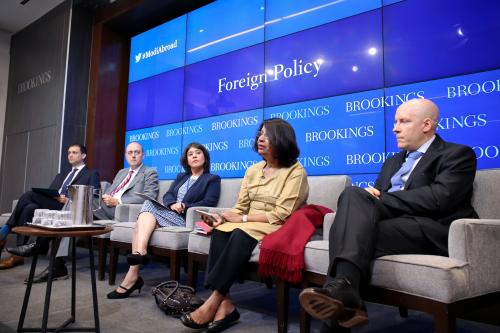
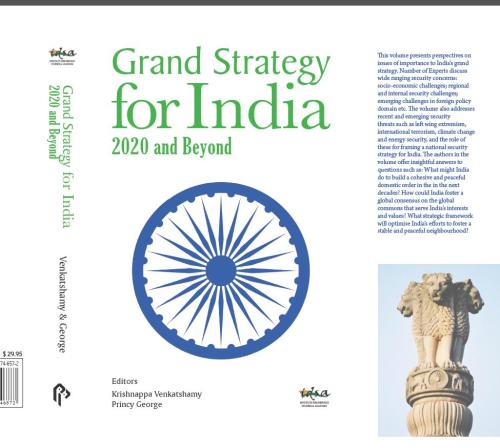




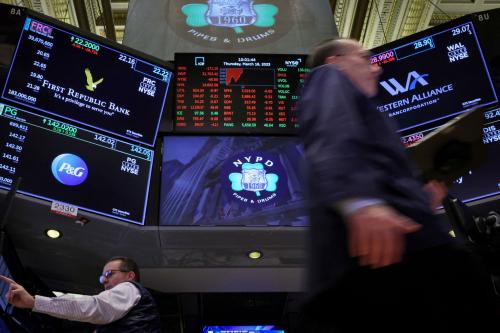

Commentary
Why India and Israel are bringing their relationship out from “under the carpet”
February 11, 2016